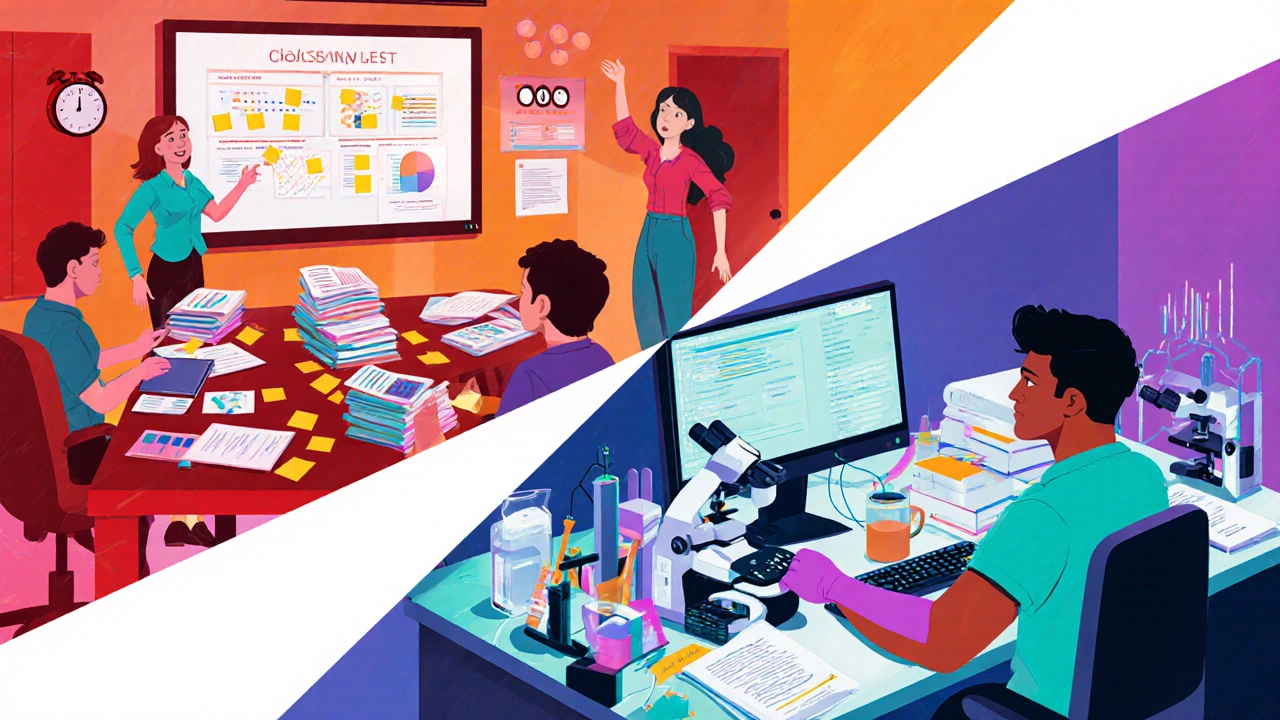MBA vs Master's Difficulty Comparison Tool
MBA
Professional degree focused on leadership and practical business skills.
Master's
Academic degree emphasizing theory and research in a specific field.
Select Your Profile Attributes
Your personalized difficulty comparison will appear here.
Difficulty Comparison Table
| Factor | MBA | Master's |
|---|---|---|
| Curriculum Rigor | High – integrated modules, frequent case discussions, leadership labs. | Medium to High – depends on discipline; often modular but less cross-functional. |
| Quantitative Demand | Moderate – finance & analytics courses require solid math but not as deep as a pure STEM master’s. | Varies – STEM master’s can be very high; humanities lower. |
| Assessment Style | Case presentations, group projects, timed simulations, occasional exams. | Research papers, thesis, mid-term/final exams, occasional projects. |
| Admission Selectivity | Very selective – GMAT/GRE scores, 3-6 years work experience, leadership essays. | Generally less stringent – GPA focus, GRE optional for many programs, limited work-experience requirement. |
| Time Commitment | Full-time: 12-24 months; Part-time: 24-48 months with weekly evenings. | Full-time: 12-24 months; Part-time: 24-36 months, often less intensive weekly workload. |
When you hear the phrase “an MBA,” you might picture endless case studies, networking events, and high‑stakes exams. A traditional master’s degree is often viewed as a more academic, research‑focused path. But which one really pushes you harder? Below we break down the core factors that shape difficulty, so you can see if the MBA’s fast‑paced business grind or the master’s scholarly depth is the bigger challenge for you.
Key Takeaways
- The MBA vs Masters comparison hinges on three pillars: curriculum intensity, admission selectivity, and time commitment.
- MBAs demand rapid decision‑making, case‑based analysis, and extensive teamwork, while master’s programs lean toward theory, research methodology, and independent projects.
- Admission hurdles are steeper for top‑tier MBA programs (GMAT/GRE scores, work experience, leadership essays) than most master’s tracks.
- Both paths can be pursued full‑time or part‑time; the part‑time route spreads effort over a longer period, reducing short‑term intensity.
- Choosing the harder option depends on your background, career goals, and learning style-not just on a blanket notion of “harder.”
What Exactly Is an MBA?
MBA (Master of Business Administration) is a professional graduate degree focused on leadership, strategy, and practical business skills. Programs typically blend lectures, simulations, and case studies that mirror real‑world dilemmas. Most MBA curricula include core pillars such as finance, marketing, operations, and organizational behavior, topped with electives that let you specialize in areas like entrepreneurship or supply‑chain management.

What Is a Master’s Degree?
A master’s degree (e.g., MSc, MA) is an academic qualification that deepens knowledge in a specific discipline-be it computer science, economics, or literature. Unlike the practice‑oriented MBA, master’s programs often emphasize theory, research methods, and sometimes a capstone project or thesis that demonstrates scholarly competence.
Core Factors That Drive Difficulty
To answer “harder,” we need a framework. Below are the five most influential dimensions:
- Curriculum Rigor - How dense and technical the coursework is.
- Quantitative Demands - The level of math, statistics, or data analysis required.
- Assessment Style - Exams, case presentations, projects, or research papers.
- Admission Selectivity - Required tests (GMAT, GRE), work experience, and essay expectations.
- Time Commitment - Weeks or months of full‑time immersion versus part‑time pacing.
Side‑by‑Side Difficulty Comparison
| Factor | MBA | Master’s (non‑MBA) |
|---|---|---|
| Curriculum Rigor | High - integrated modules, frequent case discussions, leadership labs. | Medium to High - depends on discipline; often modular but less cross‑functional. |
| Quantitative Demand | Moderate - finance & analytics courses require solid math but not as deep as a pure STEM master’s. | Varies - STEM master’s can be very high; humanities lower. |
| Assessment Style | Case presentations, group projects, timed simulations, occasional exams. | Research papers, thesis, mid‑term/final exams, occasional projects. |
| Admission Selectivity | Very selective - GMAT/GRE scores, 3‑6years work experience, leadership essays. | Generally less stringent - GPA focus, GRE optional for many programs, limited work‑experience requirement. |
| Time Commitment | Full‑time: 12‑24months; Part‑time: 24‑48months with weekly evenings. | Full‑time: 12‑24months; Part‑time: 24‑36months, often less intensive weekly workload. |
Real‑World Experiences
Emma, a former financial analyst, recalls her two‑year full‑time MBA at a top‑tier school. “The caseweek sprint felt like a marathon every three weeks,” she says. “You’d spend 60‑plus hours prepping, presenting, and debriefing with peers. The sheer speed of decision‑making was exhausting.”
Contrast that with Jamal, who completed an MSc in Data Science. “My toughest moments were the research‑heavy modules where you wrote a 40‑page thesis,” he explains. “The pressure came from depth rather than speed-long weeks in the lab, endless data cleaning, and a final defense that felt like a doctoral viva.”
Both narratives highlight that “harder” is subjective: MBAs test speed and teamwork under pressure, while master’s degrees test depth and independent scholarly rigor.
Which Path Fits Your Profile?
Ask yourself these quick questions:
- Do you thrive in collaborative, fast‑paced environments? Yes → MBA might feel more natural, though intense.
- Do you prefer solitary research and deep‑theory work? Yes → A traditional master’s could be the tougher but more rewarding route.
- Do you have 3‑5years of professional experience and leadership stories to tell? Yes → MBA admissions will likely view you favorably, but also expect higher performance.
- Is a high GMAT score (700+) or strong quantitative background a barrier for you? No → The MBA gate might feel harder.
Align the difficulty dimension that scares you most with the program’s strengths. If you dread endless group work, a master’s may feel easier. If you fear an unstructured research thesis, the MBA’s case‑driven format could be less intimidating.

Tips to Tackle Difficulty in Either Program
For MBA candidates:
- Master the case study method early-practice by summarizing Harvard Business Review cases in 2‑minute pitches.
- Leverage your cohort: form study groups, share notes, and rotate leadership on group projects to spread workload.
- Schedule weekly “reflection blocks” to de‑compress after intense simulation days.
For master’s candidates:
- Break the thesis into micro‑milestones: literature review, methodology, data collection, analysis, write‑up.
- Seek out a faculty mentor early-regular check‑ins keep the project on track and reduce isolation.
- Use data‑analysis tools (R, Python) incrementally; don’t wait until the final weeks to learn syntax.
Bottom Line
There isn’t a universal answer to “Is an MBA harder than a masters?” The difficulty depends on the axis you measure: speed vs depth, group dynamics vs independent research, or admission selectivity vs academic rigor. By mapping your personal strengths to the five difficulty factors, you can decide which program will challenge you in the most productive way.
Frequently Asked Questions
Is a full‑time MBA more demanding than a part‑time one?
Full‑time MBAs compress the curriculum into 12‑24months, meaning weekly hours can exceed 60hours, while part‑time programs spread the same content over 24‑48months with evening classes. The total workload is similar, but the intensity per week is higher for full‑time.
Do all master’s degrees require a thesis?
No. Many professional master’s programs replace a thesis with a capstone project, industry‑partnered consultancy, or a major applied research paper. The requirement varies by discipline and university.
Can I take the GMAT instead of the GRE for an MBA?
Yes. Most business schools accept either test. Your choice should reflect where you scored higher and which test aligns better with your quantitative strengths.
Is it easier to get a scholarship for an MBA or a master’s?
MBA scholarships often target leadership potential and work experience, making them competitive for seasoned professionals. Master’s scholarships may focus more on academic merit or research potential, which can be more accessible for recent graduates.
Which degree offers a better ROI?
ROI varies by industry, geography, and pre‑program salary. In the U.S., MBAs often yield a 30‑50% salary boost within three years, especially in consulting or finance. Specialized master’s degrees (e.g., data science) can deliver similar jumps for technical roles. Evaluate your target career path to decide.
